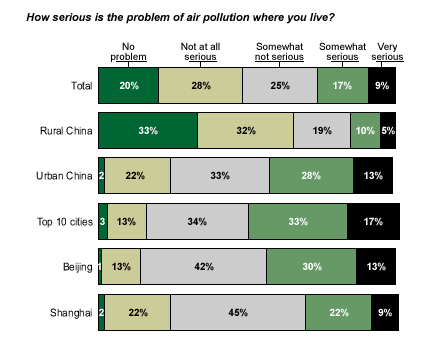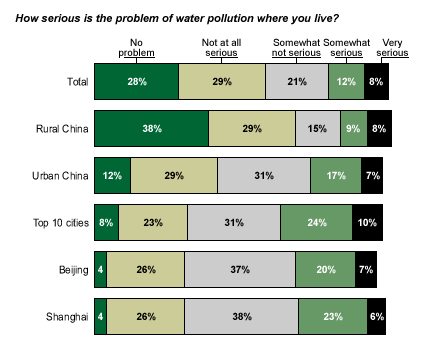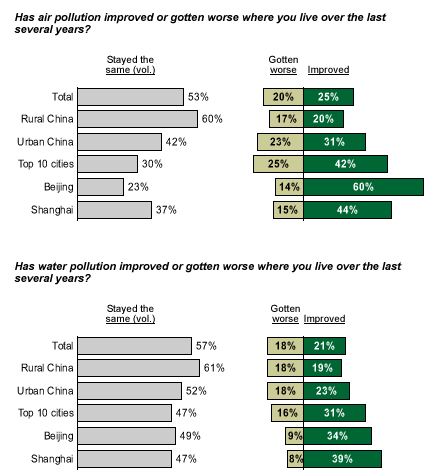In pollution, as in economic growth, China is a land of superlatives:
- World Bank research shows China is home to 16 of the world's 20
most polluted cities.
- China is now the world's second-largest emitter of carbon
dioxide emissions, and the International Energy Agency forecasts
the country to account for more than a quarter of the entire
increase in global greenhouse gas emissions in the next 25
years.
- According to World Bank reports, at least 400,000 Chinese die
every year from diseases related to air pollution.
- According to a BBC report, "more than three-quarters of the water flowing through China's cities is unsuitable for drinking because of pollution from industrial waste."
Public Perceptions of Air and Water Quality
How do China's citizens view the quality of the air they breathe? According to the most recent Gallup Poll of China, only about a quarter of all Chinese think the problem of air pollution where they live is either very (9%) or somewhat (17%) serious.
These aggregate numbers, however, are driven by the fact that a majority of all China's citizens live in rural areas, far from most direct sources of air pollution. More telling is the finding that half of those living in the country's 10 largest cities now say they view air pollution where they live as either very (17%) or somewhat (33%) serious.

Chinese express slightly less concern about water quality than air pollution, perhaps because the effects of the latter are more directly evident. Only a fifth of all Chinese see water pollution in their locales as a very (8%) or somewhat (12%) serious problem; this group is outnumbered by those who believe the local water pollution problem is not a serious problem at all (28%). In contrast to the results on air pollution, urban residents are only slightly more likely than their rural counterparts to believe their own communities are facing a water pollution challenge.

What Causes Pollution in China?
At the core of a possible looming environmental disaster is China's insatiable demand for energy. The country's domestic oil reserves are limited, and petroleum is expensive to import on the scale that the country's economy requires. A little more than a quarter (26%) of China's energy in 2001 was produced from oil, according to the Energy Information Administration.
Instead, China relies on coal -- a major source of sulfur dioxide and soot emissions -- for 63% of its energy. Last year, China burned 40% more coal than the United States did, even though the overall economic output of the United States is far larger than that of the People's Republic. Just 3% of China's energy is generated from natural gas, while 7% comes from hydroelectric plants.
Energy demand is of course rising at the individual household level because of increased affluence and mobility, but industry is by far the greatest energy consumer. According to the International Iron and Steel Institute, in 2003, China used 258 million tons of steel -- roughly 2 1/2 times the 104 million tons consumed by the United States. Lacking adequate petroleum resources, China's blast furnaces fabricate steel by burning coke derived from coal, which China has in abundance. The volume of airborne pollutants produced by the manufacture of this single commodity is thus enormous.
Governmental Reaction to the Pollution Challenge
In 1987, China's People's Congress enacted the national Air Pollution Control Law. A decade later, the 1997 Gallup Poll of China found strong public support for tackling environmental challenges. When asked whether they wished more were done in their communities to improve the quality of air and water, 88% of all Chinese said yes -- as did an astonishing 98% of those in the country's three largest cities (Beijing, Shanghai, and Guangzhou). In 1998, China established the State Environmental Protection Agency -- China's equivalent of the United States' EPA.
Subsequent legislation has addressed water pollution, "cleaner" industrial production, desertification, and environmental impact assessment, authorizing heavy fines for violators. However, a U.S. Embassy report notes, "Some localities may simply ignore the law, given the central government's limited oversight capability."
In recent years, more innovative and aggressive approaches have been adopted, often at the sub-national level. Beijing, which will host the 2008 Summer Olympic Games, has been particularly active in this regard. In 1999, its municipal government ordered the city's public transport vehicles to convert to other fuels. Within three years, Beijing boasted more than 1,900 natural-gas-fueled buses -- one of largest fleets in the world.
Progress?
Are government efforts to address China's pollution challenges beginning to pay off? In the eyes of those living in the country's largest cities, at least, the answer is yes.
When asked whether they think the problem of air pollution where they live has improved or worsened in the past several years, most Chinese (53%) volunteer that the situation has remained pretty much the same. Those who do perceive a change are slightly more likely to believe air pollution has improved (25%) than they are to believe it has gotten worse (20%).
But again, these nationwide numbers conceal the sentiment within China's largest cities. In the country's 10 largest urban areas, 42% of residents think air pollution has improved within the past few years, outnumbering the proportion (25%) who think it has gotten worse. In Beijing -- home to particularly aggressive efforts to curtail smog -- 60% say local air pollution has lessened, while just 14% take the contrary view.
At the national level, perceptions of progress in combating water pollution, a less widely recognized problem, are similarly mixed. More than half of Chinese (57%) say they notice no difference in local water quality, while the percentage who see an improvement in the past few years (21%) is almost equally matched by the percentage who see a deterioration (18%). As with air pollution, however, those in the country's 10 largest cities are significantly more likely to say the problem has improved (31%) than worsened (16%) in the past few years.

Progress on the pollution front is thus seen to be occurring in those very areas where it is a particularly serious problem: China's leading cities.
